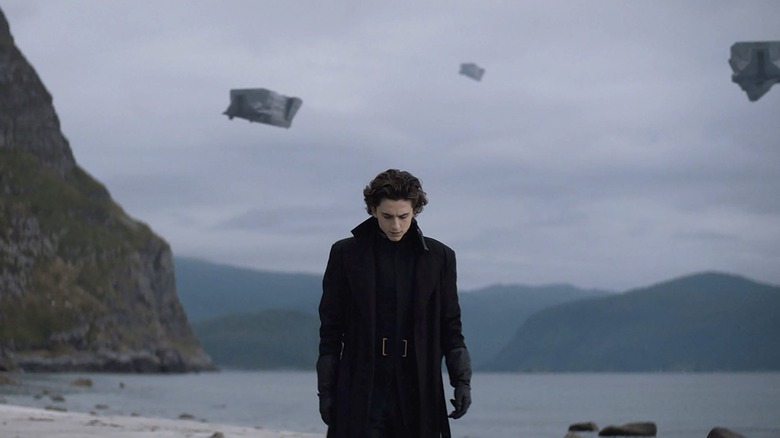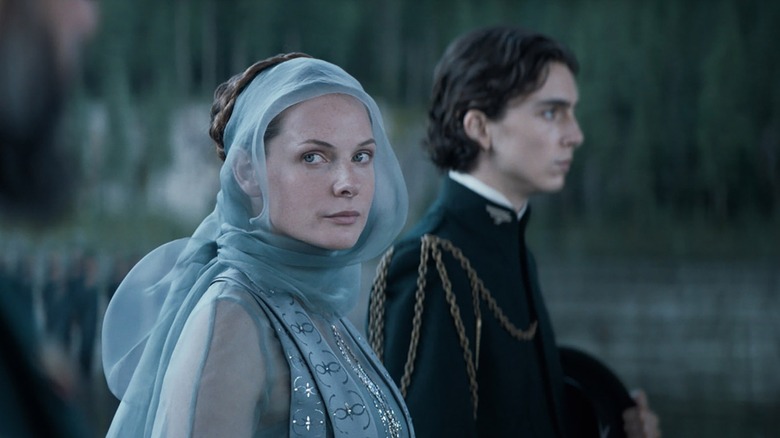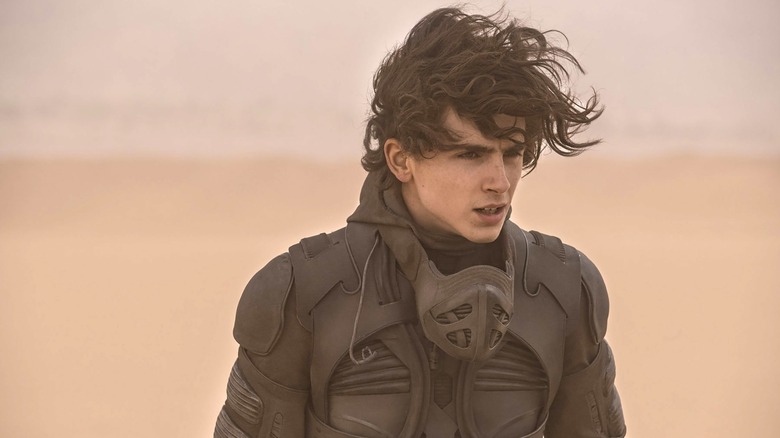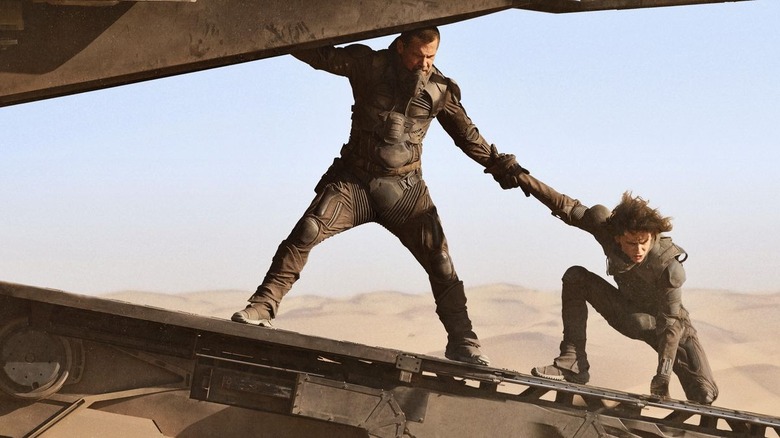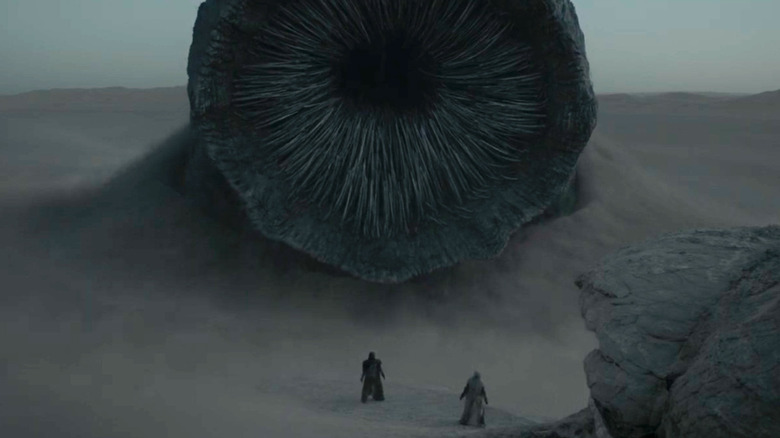Dune Spoiler Review: The Path Already Chosen — Or Is It?
Warning: spoilers ahead for "Dune."
We are oversaturated with chosen one stories. It's unsurprising that it's such a popular narrative for Hollywood to fall back on — it's been a staple of fantasy and sci-fi films for decades, and literature far beyond that. The structure has been perfected, and occasionally reinvented, but it all comes down to that tried-and-true hero's journey: wherein a young protagonist has greatness thrust upon him or her, and rises to the occasion. And we all love to root for the hero, especially on the big screen.
At first blush, that's what Denis Villeneuve's "Dune" is playing into. Throughout the sci-fi epic based on Frank Herbert's 1965 classic novel, Paul Atreides (a stone-faced Timothée Chalamet) receives strange visions, ones that hint toward his fate to lead a holy war (a more sanitized replacement for the book's "jihad") against a powerful galactic Empire. He is called by many names: the Kwisatz Haderach, the Lisan al-Gaib, the Mahdi — which all boil down to messiah, or savior. He's the One, or he could be, Charlotte Rampling's intimidating Bene Gesserit Reverend Mother practically spits at Paul's mother Lady Jessica (an incredible Rebecca Ferguson) after having examined Paul's worthiness. "We have other prospects," she coolly informs Jessica before leaving the Atreides to their impending doom at Arrakis, the highly coveted desert planet which they have just been handed as their fief by the Padishah Emperor.
In "Dune," the One is not chosen by fate, but made by human hands. And just as Paul's visions point to many possible futures, he's one of many potential "the One's." It's a slightly deflating revelation, even as Paul feels the mounting pressure of just possibly becoming this mythic Kwisatz Haderach, a superbeing with the ability to bridge space and time and lead humanity into a better future.
'Dreams Are Messages from the Deep'
The opening text of "Dune" appears on a black screen over a guttural roar that sounds like it comes from the same deep from which this message arose. It sets the stage for the dreamlike vision that Villeneuve has for "Dune," a feature film iteration that is much more about mood and feeling than it is about the incredibly dense and complex lore of Herbert's saga.
Rather than dig into the minutiae of Herbert's world, Villeneuve's "Dune" is a film of broad strokes and ambiguity, and of a gnawing uncertainty. Here is our hero, here is our evil, hulking villain, here is our shadowy empire, here is our oppressed minority. But are they all exactly as they seem? These visions that Paul receives, starting with fleeting images of Chani (Zendaya) and the sun-drenched planet Arrakis, appear to signal that he is indeed the Chosen One, with the ability to see the future. But interestingly, these visions — which appear with increasing frequency throughout the film as Paul gets further exposed to the ability-enhancing "spice" — aren't exactly cut-and-dry prophecies. Some seem to be visions of possible futures, some seem to be mostly symbolic, a few seem to point to Paul's death. It may be a result of his unplanned birth — as the Reverend Mother tells Lady Jessica, she was only supposed to bear daughters, but she instead gave birth to a son that she trained in the Bene Gesserit way — and Paul's conflicted bloodline leads him to be torn between his Atreides family duties and his emerging powers from the millennia of Bene Gesserit engineered breeding. He can't make heads or tails of his visions, and this sows doubt in the Reverend Mother that he is the Kwisatz Haderach. But even as she opines to Jessica, "so much potential, wasted in a male," she tells her that the Bene Gesserit have still laid the path for them to be accepted as a mythic savior in Arrakis. The rest is up to them.
A False Prophet or a Foreshadowed Messiah?
Like many a chosen one, Paul does not take well to the prospect of being the One. After overhearing the Reverend Mother and Jessica, he demands to know what it means. It means when they arrive at Arrakis, they will have a part to play in the salvation of humanity, Jessica tells her son. But here's where Paul does something interesting: with weary resignation, he replies, "All part of a plan."
There's a cynicism to which Paul treats this fate that's been thrust upon him. He doesn't lash out against the burden (until much later anyways) but rather grimly accepts it, as if he's been cornered and left with no other solution. Chalamet has always been a more of an introspective actor, and his subdued performance in "Dune" has earned him criticism for being bland but I think it's all intentional — Paul is very much this blank slate upon which other characters, and the film itself, project their chosen one agendas. When House Atreides lands at Arrakis, they're greeted with cheers and chants from the native Fremen, who Paul notices are all pointing at him. "These people have been waiting for centuries for the Lisan al-Gaib. They see you, they see the signs," Jessica tells Paul, informing him that the Bene Gesserit have been planting superstitions that the messianic Lisan al-Gaib, meaning the Voice from the Outer World, will soon arrive. "They see what they've been told to see," Paul replies coldly.
As an audience used to these kind of chosen one narratives, we see what we want to see too. But Villeneuve weaves enough ambiguity into the narrative of "Dune," with those uncertain visions and their many possible futures, that it casts enough doubt that this Paul's journey in "Dune" is that typical hero's journey. He's following a path laid out for him (by women and oppressed minorities, no less), but is he even supposed to be the One taking that path? Villeneuve is no stranger to deconstructing the chosen one mythos and he similarly does so here, though he's really only following what Herbert already laid out with "Dune." While it's less clear in the first book, Herbert always intended his "Dune" saga to be a rejection of the chosen one narrative.
"It began with a concept: to do a long novel about the messianic convulsions which periodically inflict themselves on human societies," Herbert explained. "I had this idea that superheroes were disastrous for humans."
That deconstruction of the chosen one narrative makes for an interesting dialogue with the story's metaphor for imperialism, which is one of the thornier and less successful parts of "Dune."
The White Savior of It All
I skipped over one interesting choice that Villeneuve made in the opening of his film. Herbert's "Dune" starts right away with Paul meeting the Reverend Mother for the Gom Jabbar test, but the film takes a little while to get there. Instead we begin with a narration from Chani, who mournfully describes the oppression of her people, the Fremen, on Arrakis by the Empire and House Harkonnen over the spice, a precious resource which has given the Empire power over insterstellar travel and made the Harkonnens obscenely rich. "My planet Arrakis is so beautiful when the sun is low," Chani murmers over scenes of bloody battles between the Fremen and the Harkonnens. But when the Harkonnens suddenly leave at the bidding of the Padishah Emperor, Chani and her fellow Fremen don't rejoice but only wonder, "Who will our next oppressors be?"
It's clear from the start that Villeneuve is emphasizing the metaphor for the Middle East and oil that Herbert presented with "Dune," maybe to a degree that is almost exoticizing. Herbert's "Dune" did this too (the patronizing language used to describe the Arab-coded Fremen is very much of its time) but Villeneuve cranks it up by showing dozens of Fremen natives in niqabs and veils, featuring buildings with Moorish architecture, and of course, using an incredible amount of ululation in Zimmer's Middle Eastern-inspired score (which also mixes in some bagpipes? It's a lot!). While it might be verging on stereotype, it does make no apologies about its criticism of imperialism. The brutal portrayal of the Harkonnens extends beyond just their bloodlust and pale, bald, monstrous forms — the Brutalist architecture world (a minimalist, concrete-heavy style that emerged out of the Cold War era) used for the Harkonnen buildings and world conveys the oppressive nature of the Harkonnens, and by extent, the Empire. The buildings literally oppress and dominate. The evil, floating hulk of a villain, Baron Harkonnen (Stellan Skarsgård) literally bathes in oil while he heals from the attempted assassination by the paralyzed Duke Leto Atreides (Oscar Isaac, so noble, so doomed), who died in the process.
So we have the two biggest elements of "Dune": the deconstruction of the chosen one narrative, and a criticism of imperialism. Where does that take us? Well, right into that good old trope, the white savior. One of Herbert's inspirations for "Dune" was the real-life Lawrence of Arabia, T.E. Lawrence, who led a revolt of Arab forces against the Ottoman Empire. Couple that with the messiah narrative of Paul's hero's journey, and you've got the start of what appears to be a rejection of the white savior trope itself.
As Paul and Jessica recover from the attack on House Atreides in the fremkit tent left for them by the traitorous Dr. Yueh (a quietly underrated performance by Chang Chen), Paul is affected by the spice in the tent and receives his strongest visions of the future yet — that of a holy war in his name, genocide committed by his armies, death and destruction, and a bloody streak that he carves through the galaxy. "Fanatical legions worshipping at the shrine of my father's skull, a war in my name!" Paul screams as Jessica tries to comfort him, only to be rejected by her distressed son. "You did this to me! You Bene Gesserit made me a freak!"
We haven't seen yet where the story takes the white savior narrative, but if these frightening visions are anything to go by, it's as subversive a take as the film has had with its chosen one arc, one where a white man leading legions of oppressed minorities doesn't lead in triumph as it does in more suffering. The vicious cycle of imperialism cannot be broken by one of its own.
This is Only the Beginning
House Atreides has fallen, attacked by House Harkonnen and the deadly imperial Sardaukar forces in the night. Duke Leto Atreides is dead, betrayed by his own doctor, who had secretly allied with Baron Harkonnen in a misguided attempt to free his captive wife. Loyal warrior Duncan Idaho (Jason Momoa, having a blast and stealing every scene that he's in) has died in battle. Dr. Liet Kynes (Sharon Duncan-Brewster), judge of the change and Fremen agent, is stabbed in the back by Sardaukar warriors after helping Paul and Jessica escape. Paul and Jessica wander the desert in exile, seeking refuge with the hostile Fremen. The legacy of House Atreides is one of failure. And that's another brilliant facet of Herbert's story and Villeneuve's film.
Villeneuve's film is aesthetically bleak — it's a film mostly in greys, blacks, with the occasional bursts of the brightness from the deadly deserts of Arrakis. It's a color scheme and tone that spells doom from the start. Just as there's no sense of triumph in Paul embracing his chosen one destiny, there's no sense of hope from the beginning of Villeneuve's "Dune," an infinitely fascinating choice for a Hollywood blockbuster in an industry that values stories of hope and of heroes triumphing over evil. It's as if the story of "Dune" has started at the beginning of the end, with the heroes' inevitable loss already on the horizon.
It's a nihilistic epic, and even as we close out "Dune," with Paul having killed his first man (in a fight that notably ends with a bullfighter's finishing move — an interesting callback to Paul's bullfighter grandfather) and won the trust of the Fremen, there's not much indication that things will get better. There's only blood and war on the path that Paul has chosen. Or maybe it's been chosen for him. Or maybe this is not the golden path after all.
